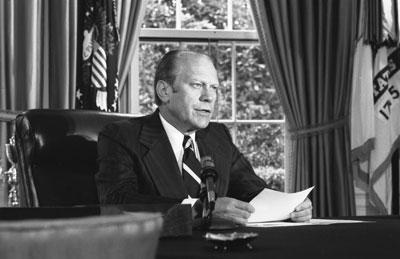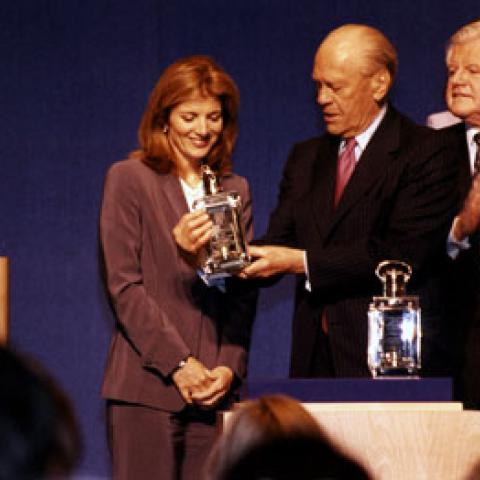
The Watergate scandal erupted after it was revealed that President Richard Nixon and his aides had engaged in illegal activities during his 1972 reelection campaign - and then attempted to cover up evidence of wrongdoing. With impeachment proceedings underway against him in Congress, Nixon bowed to public pressure and became the first American president to resign. At noon on August 9, 1974, Nixon officially ended his term, departing with his family in a helicopter from the White House lawn. Minutes later, Gerald R. Ford was sworn in as the 38th President of the United States in the East Room of the White House.
Concerned by the number of questions regarding President Nixon that came up during his first press conference on August 28, President Ford asked his White House Counsel Phil Buchen to quietly look into legal precedents for Presidential pardons. Benton Becker, a lawyer who had been involved in preparing for Ford’s Vice Presidential confirmation, assisted with the research. President Ford also talked to several key aides: Chief of Staff Alexander Haig, Secretary of State Henry Kissinger, and Counsellors Robert Hartmann and Jack Marsh. Due to the sensitivity of the topic the discussions were a closely held secret. After considering all of the research and opinions gathered, on September 7 Ford made the decision to pardon the former President.
On Sunday, September 8, 1974, President Ford addressed the nation from the Oval Office to announce his decision to “grant a full, free and absolute pardon unto Richard Nixon for all offenses against the United States which he, Richard Nixon, has committed or may have committed.” President Ford noted in his remarks that the pardon reflected both his Presidential responsibilities and his personal beliefs. Shortly after the announcement former President Nixon released a statement accepting the pardon. Although such a statement wasn’t required President Ford felt it was very significant. By resigning and accepting the pardon, Nixon was publicly acknowledging his guilt in the Watergate cover up.
The public’s reaction to the announcement, however, quickly proved that the pardon had not settled matters as President Ford had intended. The most immediate consequence was the resignation of White House Press Secretary Jerald terHorst shortly before the announcement. The President had told terHorst of the decision only the day before and terHorst felt he could not support it. The White House received thousands of letters, telegrams, and messages in the days following the pardon announcement. Reactions ranged from outrage to support. Government officials, celebrities, and citizens from around the country all weighed in with their opinions. Many felt that the pardon continued the Watergate coverup by preventing the possible indictment of the former President that could have provided answers to lingering questions. Among the overwhelming negative responses from the public was the idea that the pardon was part of a “secret deal” between Ford and Nixon.
Several Representatives requested answers to specific questions regarding and the circumstances surrounding the pardon. On October 17, 1974, President Ford appeared on Capitol Hill before the House Judiciary Committee’s Subcommittee on Criminal Justice (Hungate Committee), becoming the first sitting President to give sworn congressional testimony. He delivered an opening statement and answered questions posed by the committee members regarding when and with whom he had discussed the pardon, and why he decided to grant it.

Over time people began to reconsider President Ford’s action. He received particularly special recognition when Caroline Kennedy and Senator Ted Kennedy presented him with the John F. Kennedy Foundation’s Profiles in Courage Award on May 21, 2001. This award is given annually to an elected official who has withstood strong opposition to follow what she or he believes is the right course of action. Ford was honored for the way he put the country’s best interests ahead of his own political career in a decision that most likely contributed to his defeat in the 1976 election. “I was one of those who spoke out against his action then,” Senator Kennedy said at the presentation. “But time has a way of clarifying past events, and now we see that President Ford was right. His courage and dedication to our country made it possible for us to begin the process of healing and put the tragedy of Watergate behind us. He eminently deserves this award, and we are proud of his achievement.”
Digital Resources and Galleries:
- White House Press Releases Related to President Nixon (including the pardon), August 9, 1974 - July 8, 1976
- Memo from Leonard Garment to Philip Buchen Regarding Consideration of a Pardon, August 28, 1974
- Original Nixon Pardon, September 8, 1974 (in the holdings of the National Archives)
- Ceremonial Copy of Nixon Pardon, September 8, 1974
- Reading Copy of President Ford's Pardon Message, September 8, 1974
- President Ford's Daily Diary, September 8, 1974
- Press Secretary Gerald terHorst resignation letters, September 8, 1974:
- Benton Becker's Memo on the History and Background of the Nixon Pardon, September 9, 1974
- Memo for President Ford Regarding Pardon Reaction from Senators Packwood, Thurmon, and Cook, September 10, 1974
- H. Res. 1367 with Annotations by President Ford, September 16, 1974
- Letter to President Ford from Representative William L. Hungate (Chairman, Subcommittee on Criminal Justice), September 17, 1974
- Note from President Ford and Excerpt of Rev. Duncan Littlefair's Sermon on the Nixon Pardon September 18, 1974
- Mail Received in the Mail Room for the Period Ending September 20, 1974 (includes the pardon), September 20, 1974
- List of Responses Regarding Ford's Decision to Appear Before Hungate Committee September 30, 1974
- Form Letter in Response to Letters Against the Pardon October 1974
- Correspondence Between President Ford and Rep. Charles Sandman Regarding Ford's Appearance Before the Hungate Committee October 4, 1974
- Draft Narrative Response to H. Res. 1367 with Ford's Annotations, October 12, 1974
- Memo to President Ford Regarding Major Issues Drawing Presidential Mail (including Nixon Pardon), January 6, 1977
- Remarks by Gerald Ford Upon Receiving the Profile in Courage Award, John F. Kennedy Library, May 21, 2001
- Digitized Collections for Additional Research:
- Ford Library Materials Related to the Nixon Pardon in the National Archives Catalog, September 8 - October 17, 1974
- White House Press Secretary's Press Briefing Transcripts (topics include the pardon)
- Philip Buchen's Files related to the pardon (Counsel to President Ford)
- Benton L. Becker's Papers (attorney and adviser)
Photographs:
- White House Photograph Contact Sheets:
- Day of Pardon, September 8, 1974
- Day Ford Appeared Before Subcommittee on Criminal Justice (Hungate Committee), October 17, 1974
White House Communications Agency Audio Recordings:
- Remarks of the President Gerald R. Ford from a Film Clip Announcing the Pardon, WAV or MP3
- Tape A (Part 1 of 2). President Gerald R. Ford Remarks at Hungate Subcommittee Hearing on Nixon Pardon, WAV or MP3
- Tape A (Part 2 of 2). President Gerald R. Ford remarks at Hungate Subcommittee Hearing on Nixon Pardon, WAV or MP3
- Tape B President Gerald R. Ford remarks at Hungate Subcommittee Hearing on Nixon Pardon, WAV or MP3
